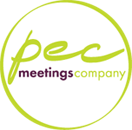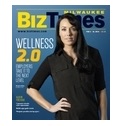Mobile Apps Diversify Engagement at Corporate Events
BizTimes Milwaukee, February 2014
Meeting planners and companies are tapping into the power of mobile apps to add greater digital dimension to their events. Mobile apps created specifically for corporate events, conventions and social events are practically becoming a necessity because they can unlock new means of engagement and communication among event organizers, event attendees and exhibitors.
“Meeting planners are recognizing that mobile apps are no longer just a nice add-on,” said Denice Waldhuetter, vice president and co-owner of Milwaukee-based PEC Meetings Company, a meeting and convention planning agency. “They’re essential tools for engaging their attendees in the meeting content and also engaging their attendees one-on-one. It’s just a way to share information and a way to better engage for business prospecting.”
The avenues of engagement on these apps can be as robust and customized as a company wants.
In addition to showcasing speaker profiles and outlining an event schedule, event apps can display interactive maps and venue floor plans, list sponsor information, store directories of exhibitors and attendees, and enable attendees to arrange their personal agendas. Event apps’ capabilities also often allow for the display of Twitter and RSS feeds that can ping attendees with event updates.
From an even greater interactive standpoint, mobile apps created specifically for events can incorporate live polls and surveys so event attendees and speakers can better converge around the content presented.
These capabilities are rounded out by specific analytics event organizers can use to track adoption rates and see how the apps are being utilized during events.
Connecting people with people
BoothTag, a Milwaukee-based information technology and services company that provides a mobile app platform for events, partners with tradeshow producers, event organizers, conferences and nonprofit organizations across the country to build apps that complement the focal points of their events.
“At the end of the day, the app experience should be driving the real-world experience,” said Bill Finn, chief executive officer of BoothTag, which won Marquette University’s 2012 Business Plan Competition. “It should be contributing to and funneling toward that real world experience so that we’re not focused all the time on what’s happening (with) the app.”
One of the primary ways BoothTag works to drive real-world experience for event participants is through gamification, a concept in which gaming principles are applied to a business application so users are more engaged and interactive throughout the duration of an event.
For example, BoothTag can motivate attendees to visit exhibitor booths on a tradeshow floor by rewarding them for checking in at exhibitor booths and networking with fellow attendees. Using their smartphones, event participants scan QR codes at different booths and earn points while making connections.
In this way, gamification might play out as a scavenger hunt, steering attendees to specific booths through clues displayed on the event’s mobile app.
Other gamification opportunities reward event-goers for attending specific workshops or seminars.
“It helps (attendees) explore by giving them a reason to connect to as many different areas as possible,” Finn said.
And it injects a sense of fun and friendly competition into events as it incentivizes attendees to visit exhibitor booths or check out presentations they otherwise wouldn’t.
“The point of gamification, at least from our eyes, is to connect people with people,” Finn said.
Along with gamification, which distinguishes BoothTag from dozens of competitors, the company provides clients with lead qualification tools. With these tools, exhibitors can immediately evaluate and track which attendees they want to follow up with at a later date.
Both gamification and lead qualification tools ensure value for event exhibitors at tradeshows and conferences, as these capabilities drive traffic and monitor quality business prospects, Finn said.
The logistics
Omnipress, a Madison-based event content solutions firm, also creates and customizes mobile apps in the events market, serving associations, societies and member-based groups, corporations, independent meeting planners, and for-profit training organizations.
Both Omnipress and BoothTag provide a full spectrum of mobile app options, with native apps that allow content to be accessed by different mobile operating systems, including iOS and Android, and web apps that cater to Blackberry and Windows phone users.
Each company can also create a solution accessible by any device with a browser. Omnipress offers companies what it refers to as a digital publishing platform, which is essentially a website – a web-based mobile solution – built with a responsive design so that it looks and feels like an app.
Digital publishing platforms can host a lot more material than standard apps and can function as a central depository to store past event materials and other important documents. These kinds of platforms also serve as a centralized location so that meeting planners and event organizers can update information in one place for both websites and mobile apps.
Digital publishing platforms work well for events spanning multiple days with many presentations, documents and abstracts, according to Bob Hamm, senior account manager at Omnipress.
In budgeting for these mobile app solutions, Hamm said companies should plan on committing at least $3,500. Finn said an event-based entry-level app will run from $4,000 to $5,000.
But before a company can determine its budget, it must determine how an app would benefit event attendees and exhibitors, as well as the company itself.
“What’s our mobile strategy? What are we trying to accomplish? What’s the right tool?” are critical launch pad questions as companies begin to explore their options, Hamm said.
A growing trend
While the popularity of mobile apps varies among companies and industries in the national landscape of corporate events, the overall trend suggests they will only gain more traction, said Finn.
When he started BoothTag, the company faced about five competitors nationally. Today, he estimates 75 to 100 app developers specializing in events populate the market.
“It’s very reflective of how the public in general is using their mobile phones,” Finn said.
In Milwaukee, the trend of incorporating mobile apps into events is still a relatively new one.
“Milwaukee does tend to lag behind the coasts a little bit in terms of technology adoption, but that’s not necessarily bad,” Finn said. “It just means that it’s a solidly established trend by the time it arrives here.”
Monday, February 3, 2014
By Erica Breunlin / BizTimes Media







